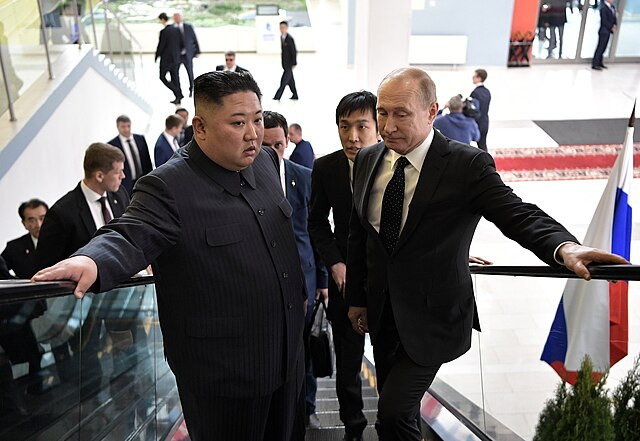Russian President Vladimir Putin and North Korean leader Kim Jong Un have announced a comprehensive strategic partnership, pledging mutual support in case of external aggression. This "breakthrough" agreement marks a significant deepening of ties between the two nations, as both leaders seek to counter what they describe as hostile US policies.
Thousands of North Koreans lined the streets of Pyongyang, waving Russian and North Korean flags, to welcome Putin on his first visit to the country in 24 years. The leaders signed the new partnership agreement at a grand ceremony in Kim Il Sung Square, with military personnel, children holding balloons, and large portraits of the two leaders providing a celebratory backdrop.
Putin highlighted the significance of the new agreement, which replaces previous deals from 1961, 2000, and 2001. "The comprehensive partnership agreement signed today includes, among other things, the provision of mutual assistance in the event of aggression against one of the parties to this agreement," Putin stated, emphasizing the pact's scope, which spans political, trade, investment, cultural, and security spheres.
Kim Jong Un hailed the new "alliance" as a "watershed moment in the development of bilateral relations." He expressed his "full support and solidarity with the struggles of the Russian government, military, and the people," specifically referencing Moscow's war in Ukraine.
During the visit, Putin received a warm reception, with mounted soldiers and military bands celebrating his arrival. The two leaders exchanged gifts, with Putin presenting Kim with an Aurus car and a tea set, while Kim reciprocated with artworks depicting the Russian leader.
Putin's visit, which coincided with the anniversary of his last trip to Pyongyang in 2000, underscores the countries' shared animosity toward the West and concerns over their growing military cooperation. Multiple governments have accused North Korea of supplying arms to Russia for its war in Ukraine, a charge both nations have denied despite significant evidence.
In his remarks, Kim reiterated North Korea's unwavering support for Russia, especially in its conflict with Ukraine. "Situations continue to be complicated and ever-changing, but I would like to take this opportunity to reiterate that we will continue to strengthen and closely engage in strategic communication with the Russian leadership," Kim said.
The burgeoning relationship has sparked concern in both Seoul and Washington. The possibility of Russia transferring advanced military technology to North Korea, enhancing its heavily sanctioned weapons program, is particularly troubling for these nations. The US and South Korea have accused North Korea of providing Russia with artillery, missiles, and other military equipment, potentially in exchange for economic assistance and advanced military technology.
US Secretary of State Antony Blinken highlighted the implications of the new alliance. "North Korea is providing significant munitions to Russia ... and other weapons for use in Ukraine. Iran has been providing weaponry, including drones, that have been used against civilians and civilian infrastructure," Blinken said, following a meeting with NATO chief Jens Stoltenberg.
In Pyongyang, Putin acknowledged North Korea's support for Russia's war in Ukraine, framing it as a fight against "the imperialist hegemonistic policies of the US and its satellites." He emphasized the historical ties between Russia and North Korea, dating back to the Soviet army's fight against Japanese forces on the Korean Peninsula during World War II.
Kim, visibly pleased, described the current relationship as closer than ever before, surpassing the "fiery friendship" of Soviet times. He promised "full support and solidarity to the Russian government, army, and people in carrying out the special military operation in Ukraine to protect sovereignty, security interests, and territorial integrity."
While the details of the new agreement were not immediately disclosed, the partnership symbolizes a significant alignment of interests between Russia and North Korea. The two countries, both facing heavy international sanctions, are likely to benefit from each other's support in various sectors, including military technology and economic assistance.
The meeting follows Kim's visit to Russia last year, where discussions on arms supplies and military cooperation were initiated. Since then, reports indicate that North Korea has supplied Russia with substantial munitions and military equipment.
The renewed ties between Russia and North Korea come at a time of heightened tensions on the Korean Peninsula. Kim has ramped up his country's missile tests and military exercises, while the US, South Korea, and Japan have intensified their own joint military drills in response.




